|
|
|
| (1 промежуточная версия не показана) | | Строка 3: |
Строка 3: |
| | '''[[Гипермаркет знаний - первый в мире!|Гипермаркет знаний]]>>[[Английский язык|Английский язык]]>>[[Английский язык 9 класс|Английский язык 9 класс]]>> Don't forget your medical insurance''' | | '''[[Гипермаркет знаний - первый в мире!|Гипермаркет знаний]]>>[[Английский язык|Английский язык]]>>[[Английский язык 9 класс|Английский язык 9 класс]]>> Don't forget your medical insurance''' |
| | | | |
| - | <br> | + | <br> <br> |
| | | | |
| - | урок 7<br><br>Don't forget your medical insurance<br><br>Когда вы рассказываете о чем-либо в косвенной речи, обращайте внимание на глаголы, вводящие косвенную речь. Необходимо использовать различные глаголы, употребляя их в соответствии с контекстом.<br><br>Глаголы, вводящие утвердительные предложения в косвенную речь to admit — признавать She said, "I am wrong." — Она сказала: "Я неправа". She admitted that she was wrong. — Она признала, что она неправа.<br><br>to complain — жаловаться She said, "Unfortunately, I've gained weight." She complained that she had gained weight. — Она пожаловалась, что набрала в весе.<br><br>to decide — решать He said, "I won 't go with you." He decided not to go with them. — Он решил не ходить с ними.<br><br>to explain to smb that — объяснять кому-то, что-то Emily said to Jane, "You get upset because you think that everybody is looking at you." Emily explained to Jane that she got upset because she thought that everybody was looking at her. — Эмили объяснила Джейн, что она расстраивается, потому что думает, что все смотрят на нее.<br><br>to reply — отвечать Jeff asked Bill, "Do you know this man?" Bill said, "No, I don't." Jeff asked Bill if he knew that man. Bill replied that he didn't.— Джеф спросил Билла, знает ли он этого человека. Билл ответил, что не знает.<br><br>to warn — предупреждать The doctor said to Molly, "Don't skip meals. It won't do you any good." The doctor warned Molly not to skip meals because it wouldn 't do her any good. "— Доктор предупредил Молли, чтобы она не пренебрегала едой, потому что это не принесет ей никакой пользы.<br><br>to inform — информировать John's teacher wrote to his parents, "Your son has been expelled from school." John's teacher informed his parents that their son had been expelled from school."— Учитель Джона проинформировал его родителей, что их сын был исключен из школы.<br><br>to advise — рекомендовать The doctor said to Sabby, "You '11 have to eat less bread and sugar." The doctor advised Sabby to est less bread and sugar. — Доктор посоветовал Сэбби есть меньше хлеба и сахара.<br><br>Некоторые предложения целесообразнее не переводить дословно в косвенную речь, а передавать их смысл с помощью следующих глаголов.<br><br>• to agree / disagree with somebody — соглашаться / не соглашаться с кем-либо<br>• to agree / refuse to do something — соглашаться / отказываться делать что-либо<br>• to accept (an offer, an invitation) — принимать (предложение, приглашение)<br><br>Alex said to his friend, "I won't go with you." — Алекс сказал другу: "Я не пойду с тобой".<br>Alex refused to go with his friend. — Алекс отказался пойти с другом. Kate told her friend, "OK. Let's imate Jane." — Кэйт сказала подруге: "Хорошо. Давай пригласим Джейн".<br>Kate agreed to invite Jane. — Кэйт согласилась пригласить Джейн. <br><br>1 Express the same idea using reported speech and the verbs in brackets.<br><br>Model: "1 have a headache," the boy said, (complain) — The boy<br> complained that he had a headache.<br> <br>1. The doctor said, "You shouldn't go out today." (warn)<br>2. "Your son has had two detentions this week," the teacher told the boy's mother, (inform)<br>3. "I'll go home," the boy told himself, (decide)<br>4. "Yes, this dress is very nice," the mother told her daughter, (agree)<br>5. "I won't do it again," said the girl, (promise)<br>6. "Kate started the fight," Peter told his teacher, (complain)<br>7. My brother said, "I won't answer this question." (refuse)<br>8. "It was my mistake," the manager said, (admit)<br>9. "Phone your friend Robert," the mother told her son. (advise)<br>10. The father said to his daughter, "I agree with you." (agree)<br>11. Melanie wrote to Ann, "I'll come to your birthday party." (accept)<br><br>2 Emily and her friends were leaving the hospital when they saw Olga, Emily's<br>grandmother. Read the dialogue and answer the questions.<br><br>1. What has happened?<br>2. Who refused to take the friends to the hospital?<br>3. Did the friends agree with the decision?<br>4. Who went to the hospital?<br><br>Olga: What are you doing here, guys?<br>Emily: We've been visiting my friend Jane. And what about you, Grandma?<br>Olga: Oh, one of the doctors, whom I've known for ages, has just phoned me and asked for help.<br>Mark: What has happened?<br>Olga: A Russian lady and her son came to the hospital this morning. The boy is very ill, but he and his mother can't explain anything. I have come to translate for them.<br>Misha: I can help too.<br>Rob: We'll all go.<br>Olga: Thank you, but I don't think it's a good idea. I can't take all of you with me. <br>Emily: Grandma is right. Let Misha go with her and we'll wait here. <br><br>карт<br> <br><br>3 The tourists from Russia told Misha their story. Look at the pictures and guess the meaning of the words.<br><br>карт<br><br>4 Read the story and find out what happened to Kolya.<br><br>карт<br><br>карт<br><br>5 Misha is helping the tourists from Russia tell their story to the doctors in the hospital. Try to write the story in reported speech. Use the verbs from the list on page 100.<br><br>6 Listen to the story and check your version of it. In most cases more than one version can be correct.<br><br>7 Read about what happened at the doctor's office and then write dialogues for the pictures.<br><br>Model: The doctor asked Kolya where it hurt. Kolya <br> replied that he had a headache and was feeling <br> very weak.<br><br>1. He added that the boy would have to stay in bed for two days and take some medicine.<br>2. The doctor gave Lena a prescription for antibiotics and a nasal spray.Then the Russian tourists said goodbye and went to the drugstore.<br>3. The shop assistant took the prescription and warned Lena that the antibiotics and the nasal spray cost $180. Lena exclaimed that she didn't have enough money, but the shop assistant advised her to phone the insurance company again.<br>4. The insurance company agreed to pay for the medicine and Lena thanked them for that.<br>5. In the end Lena decided that it had been a very good idea to get some medical insurance. Kolya agreed.<br><br>карт<br><br><br>8 What have you learned from this lesson? Are these statements true or false?<br><br>1. In America you can't buy any medicine without a prescription.<br>2. In America buying medicine without a prescription is more expensive.<br>3. Tourists should get medical insurance only if they need it to get a visa for a foreign country.<br>4. People should get medical insurance because it will help them if they get ill.<br>5. In America medicine is more expensive than in Russia. <br> <br>Homework<br><br>A Read the story and rewrite it in reported speech. Answer why the first manager couldn't insure the man's life.<br><br>карт<br><br>Honesty<br><br>A young man went into an insurance office.<br>He wanted to get some life insurance. The manager of the company said to him "We'll have to ask you a couple of questions."<br>"That's OK," the young man answered. "I'm happy to answer your questions."<br>"Did your parents have any illnesses?"<br>"Yes, actually. My mother was very unhealthy when she was a child, and she had problems with her health all her life."<br>"And was your father healthy?" the manager asked.<br>"Not really, he had heart problems."<br>"I'm sorry to hear that," the manager said quietly. "How old were they when they died?"<br>"Oh, they were still very young. My mother was thirty-five and my father was forty."<br>The manager sighed. "I'm sorry, sir," he said, "but I can't give you any life insurance."<br>When the man was leaving the office, another manager came up to him. "You mustn't be so honest with people," he smiled. "Next time use your imagination and make something up."<br>The young man went to another insurance company. The manager immediately asked him "Did your parents have any illnesses?" and "How old were they when they died?" But this time the young man was ready with an answer.<br>"My mother was very keen on sports. She died when she was ninety because she fell off her bike. My father was ninety-nine and died while he was playing football. He had missed the ball and was very upset about it."<br>The manager gave a big smile. "We must give you some life insurance right away, sir!" he said.<br><br>В Be ready to retell the story.<br><br>С Turn the following sentences into reported speech. Use ask, advise, agree, refuse, complain, promise.<br><br>1. "Don't phone Liz now," he said. <br>2. "Will you help me?" she asked. "Never," he said. <br>3. "Would you like some juice?" Bill asked. "Yes, please," Lisa said.<br>4. "May I give you some advice?" he said to the woman.<br>5. "I have a toothache," the girl cried.<br>6. "Of course I'll lend you the money," her brother said to her.<br>7. "I'll do my best to come back by 10 o'clock," Wendy said to her mother.<br><br>D Translate the sentences into English.<br><br>1. Нам предложили помощь.<br>2. Он отказался идти на вечеринку.<br>3. Мы посоветовали им позвонить врачу.<br>4. Продавец отказался продать лекарство без рецепта.<br>5. Она обещала послать телеграмму вечером.<br>6. Она согласилась встретить его.<br>7. Они не приняли нашего приглашения.<br>8. Она пожаловалась, что у сына высокая температура.<br>9. Друзья не советовали ей ехать в Египет летом.<br><br><br><br><br><br><br><br><br>
| + | <br><br>[[Image:28-10-2.jpg|460px|Don't forget your medical insurance]]<br><br>Когда вы рассказываете о чем-либо в косвенной речи, обращайте внимание на глаголы, вводящие косвенную речь. Необходимо использовать различные [[Разноспрягаемые_глаголы._Ілюстрації|глаголы]], употребляя их в соответствии с контекстом. |
| | | | |
| | + | '''Глаголы, вводящие утвердительные предложения в косвенную речь to ''admit'' '''— признавать She said, "I am wrong." — Она сказала: "Я неправа". She admitted that she was wrong. — Она признала, что она неправа. |
| | | | |
| | + | '''to complain '''—''' '''жаловаться She said, "Unfortunately, I've gained weight." She complained that she had gained weight. — Она пожаловалась, что набрала в весе. |
| | | | |
| - | ''К. И. Кауфман, М. Ю. Кауфман Английский язык: Счастливый английский.ру / Happy English.ru: Учебник англ. яз. для 9 кл. общеобраз. учрежд.— Обнинск: Титул, 2008.— 288 с: ил.'' | + | '''to decide''' — решать He said, "I won 't go with you." He decided not to go with them. — Он решил не ходить с ними. |
| | + | |
| | + | '''to explain to smb that'''объяснять кому-то, что-то Emily said to Jane, "You get upset because you think that everybody is looking at you." Emily explained to Jane that she got upset because she thought that everybody was looking at her. — Эмили объяснила Джейн, что она расстраивается, потому что думает, что все смотрят на нее. |
| | + | |
| | + | '''to reply''' — отвечать Jeff asked Bill, "Do you know this man?" Bill said, "No, I don't." Jeff asked Bill if he knew that man. Bill replied that he didn't.— Джеф спросил Билла, знает ли он этого человека. Билл ответил, что не знает. |
| | + | |
| | + | '''to warn''' — предупреждать The doctor said to Molly, "Don't skip meals. It won't do you any good." The doctor warned Molly not to skip meals because it wouldn 't do her any good. "— Доктор предупредил Молли, чтобы она не пренебрегала едой, потому что это не принесет ей никакой пользы. |
| | + | |
| | + | '''to inform''' — информировать John's teacher wrote to his [[What_do_his_parents_want_him_to_do?|parents]], "Your son has been expelled from school." John's teacher informed his parents that their son had been expelled from school."— Учитель Джона проинформировал его родителей, что их сын был исключен из школы. |
| | + | |
| | + | '''to advise''' — рекомендовать The doctor said to Sabby, "You '11 have to eat less bread and sugar." The doctor advised Sabby to est less bread and sugar. — Доктор посоветовал Сэбби есть меньше хлеба и сахара.<br><br>Некоторые предложения целесообразнее не переводить дословно в косвенную речь, а передавать их смысл с помощью следующих глаголов.<br><br>• '''to agree / disagree''' with [[Местоимения_something,_nothing,_anything,_somebody,_nobody,_anybody,_somewhere,_anywhere,_nowhere|somebody]] — соглашаться / не соглашаться с кем-либо<br>• ''' to agree / refuse''' to do something — соглашаться / отказываться делать что-либо<br>• '''to accept''' (an offer, an invitation) — принимать (предложение, приглашение)<br><br>Alex said to his friend, "I won't go with you." — Алекс сказал другу: "Я не пойду с тобой".<br>Alex refused to go with his friend. — Алекс отказался пойти с другом. Kate told her friend, "OK. Let's imate Jane." — Кэйт сказала подруге: "Хорошо. Давай пригласим Джейн".<br>Kate agreed to invite Jane. — Кэйт согласилась пригласить Джейн. <br><br>'''1 Express the same idea using reported speech and the verbs in brackets.'''<br><br>'''Model:'''"I have a headache," the boy said, (complain) — The boy<br> complained that he had a headache.<br> <br>1. The doctor said, "You shouldn't go out today." (warn)<br>2. "Your son has had two detentions this week," the teacher told the boy's mother, (inform)<br>3. "I'll go home," the boy told himself, (decide)<br>4. "Yes, this dress is very nice," the mother told her daughter, (agree)<br>5. "I won't do it again," said the girl, (promise)<br>6. "Kate started the fight," Peter told his teacher, (complain)<br>7. My brother said, "I won't answer this [[Граматичний_матеріал:_Indirect_Questions._Повні_уроки|question]]." (refuse)<br>8. "It was my mistake," the manager said, (admit)<br>9. "Phone your friend Robert," the mother told her son. (advise)<br>10. The father said to his daughter, "I agree with you." (agree)<br>11. Melanie wrote to Ann, "I'll come to your birthday party." (accept)<br><br>'''2 Emily and her friends were leaving the hospital when they saw Olga, Emily's grandmother. Read the dialogue and answer the questions.'''<br><br>1. What has happened?<br>2. Who refused to take the friends to the hospital?<br>3. Did the friends agree with the decision?<br>4. Who went to the hospital?<br><br>Olga: What are you doing here, guys?<br>Emily: We've been visiting my friend Jane. And what about you, Grandma?<br>Olga: Oh, one of the doctors, whom I've known for ages, has just phoned me and asked for help.<br>Mark: What has happened?<br>Olga: A [[Great_Russian_poets|Russian]] lady and her son came to the hospital this morning. The boy is very ill, but he and his mother can't explain anything. I have come to translate for them.<br>Misha: I can help too.<br>Rob: We'll all go.<br>Olga: Thank you, but I don't think it's a good idea. I can't take all of you with me. <br>Emily: Grandma is right. Let Misha go with her and we'll wait here. <br><br>[[Image:28-10-3.jpg|200px|доктор]] <br><br>'''3 The tourists from Russia told Misha their [[Письмова_робота_A_story|story]]. Look at the pictures and guess the meaning of the words.'''<br><br>[[Image:28-10-4.jpg|460px|доктор]]<br><br>'''4 Read the story and find out what happened to Kolya.'''<br><br>[[Image:28-10-5.jpg|460px|болезнь]]<br><br>[[Image:28-10-6.jpg|460px|болезнь]]<br><br>'''5 Misha is helping the [[Читання:_Travel_tips_for_tourists|tourists]] from Russia tell their story to the doctors in the hospital. Try to write the story in reported speech. Use the verbs from the list on page 100.<br><br>6 Listen to the story and check your version of it. In most cases more than one version can be correct.<br><br>7 Read about what happened at the doctor's office and then write dialogues for the pictures.<br>'''<br>'''Model:'''The doctor asked Kolya where it hurt. Kolya <br> replied that he had a headache and was feeling <br> very weak.''<br>''<br>1. He added that the boy would have to stay in bed for two days and take some medicine.<br>2. The [["An_apple_a_day_keeps_the_doctor_away"|doctor]] gave Lena a prescription for antibiotics and a nasal spray.Then the Russian tourists said goodbye and went to the drugstore.<br>3. The shop assistant took the prescription and warned Lena that the antibiotics and the nasal spray cost $180. Lena exclaimed that she didn't have enough money, but the shop assistant advised her to phone the insurance company again.<br>4. The insurance company agreed to pay for the medicine and Lena thanked them for that.<br>5. In the end Lena decided that it had been a very good idea to get some medical insurance. Kolya agreed.<br><br>[[Image:28-10-7.jpg|460px|медицина]]<br><br><br>'''8 What have you learned from this lesson? Are these statements true or false?'''<br><br>1. In America you can't buy any medicine without a prescription.<br>2. In America buying medicine without a prescription is more expensive.<br>3. Tourists should get medical insurance only if they need it to get a visa for a foreign [[In_the_country_DoDidDone|country]].<br>4. People should get medical insurance because it will help them if they get ill.<br>5. In America medicine is more expensive than in Russia. <br> <br>'''Homework'''<br>'''<br>A Read the story and rewrite it in reported speech. Answer why the first manager couldn't insure the man's life.'''<br><br>[[Image:28-10-8.jpg|300px|на приеме у врача]]<br><br>'''Honesty'''<br><br>A young man went into an insurance office.<br>He wanted to get some life insurance. The manager of the company said to him "We'll have to ask you a couple of questions."<br>"That's OK," the young man answered. "I'm happy to answer your questions."<br>"Did your parents have any illnesses?"<br>"Yes, actually. My mother was very unhealthy when she was a child, and she had problems with her health all her life."<br>"And was your father healthy?" the manager asked.<br>"Not really, he had heart [[Topic_4_The_Environment_and_its_Problems|problems]]."<br>"I'm sorry to hear that," the manager said quietly. "How old were they when they died?"<br>"Oh, they were still very young. My mother was thirty-five and my father was forty."<br>The manager sighed. "I'm sorry, sir," he said, "but I can't give you any life insurance."<br>When the man was leaving the office, another manager came up to him. "You mustn't be so honest with people," he smiled. "Next time use your imagination and make [[Местоимения_something,_nothing,_anything,_somebody,_nobody,_anybody,_somewhere,_anywhere,_nowhere|something]] up."<br>The young man went to another insurance company. The manager immediately asked him "Did your parents have any illnesses?" and "How old were they when they died?" But this time the young man was ready with an answer.<br>"My mother was very keen on sports. She died when she was ninety because she fell off her bike. My father was ninety-nine and died while he was playing football. He had missed the ball and was very upset about it."<br>The manager gave a big smile. "We must give you some life insurance right away, sir!" he said.<br><br>'''В Be ready to retell the story.<br><br>С Turn the following sentences into reported speech. Use ask, advise, agree, refuse, complain, promise.<br>'''<br>1. "Don't phone Liz now," he said. <br>2. "Will you help me?" she asked. "Never," he said. <br>3. "Would you like some juice?" Bill asked. "Yes, please," Lisa said.<br>4. "May I give you some advice?" he said to the woman.<br>5. "I have a toothache," the girl cried.<br>6. "Of course I'll lend you the money," her brother said to her.<br>7. "I'll do my best to come back by 10 o'clock," Wendy said to her mother.<br>'''<br>D Translate the sentences into English.'''<br><br>1. Нам предложили помощь.<br>2. Он отказался идти на вечеринку.<br>3. Мы посоветовали им позвонить врачу.<br>4. Продавец отказался продать лекарство без рецепта.<br>5. Она обещала послать телеграмму вечером.<br>6. Она согласилась встретить его.<br>7. Они не приняли нашего приглашения.<br>8. Она пожаловалась, что у сына высокая [[Температура|температура]].<br>9. Друзья не советовали ей ехать в Египет летом.<br><br><br><br><br><br> |
| | + | |
| | + | <br> |
| | + | |
| | + | ''К. И. Кауфман, М. Ю. Кауфман [[Английский_язык_10_класс|Английский язык]]: Счастливый английский.ру / Happy English.ru: Учебник англ. яз. для 9 кл. общеобраз. учрежд.— Обнинск: Титул, 2008.— 288 с: ил.'' |
| | | | |
| | <br> <sub>Английский язык для 9 класса, учебники и книги по английскому языку [[Английский язык|скачать]], библиотека [[Гипермаркет знаний - первый в мире!|онлайн]] </sub> | | <br> <sub>Английский язык для 9 класса, учебники и книги по английскому языку [[Английский язык|скачать]], библиотека [[Гипермаркет знаний - первый в мире!|онлайн]] </sub> |
| Строка 29: |
Строка 45: |
| | [[Image:1236084776 kr.jpg|10x10px|1236084776 kr.jpg]] дискуссионные вопросы | | [[Image:1236084776 kr.jpg|10x10px|1236084776 kr.jpg]] дискуссионные вопросы |
| | [[Image:1236084776 kr.jpg|10x10px|1236084776 kr.jpg]] риторические вопросы от учеников | | [[Image:1236084776 kr.jpg|10x10px|1236084776 kr.jpg]] риторические вопросы от учеников |
| - |
| + | |
| | '''<u>Иллюстрации</u>''' | | '''<u>Иллюстрации</u>''' |
| | <u></u>'''[[Image:1236084776 kr.jpg|10x10px|1236084776 kr.jpg]] аудио-, видеоклипы и мультимедиа ''' | | <u></u>'''[[Image:1236084776 kr.jpg|10x10px|1236084776 kr.jpg]] аудио-, видеоклипы и мультимедиа ''' |
| Строка 51: |
Строка 67: |
| | [[Image:1236084776 kr.jpg|10x10px|1236084776 kr.jpg]] элементы новаторства на уроке | | [[Image:1236084776 kr.jpg|10x10px|1236084776 kr.jpg]] элементы новаторства на уроке |
| | [[Image:1236084776 kr.jpg|10x10px|1236084776 kr.jpg]] замена устаревших знаний новыми | | [[Image:1236084776 kr.jpg|10x10px|1236084776 kr.jpg]] замена устаревших знаний новыми |
| - |
| + | |
| | '''<u>Только для учителей</u>''' | | '''<u>Только для учителей</u>''' |
| | <u></u>'''[[Image:1236084776 kr.jpg|10x10px|1236084776 kr.jpg]] идеальные уроки ''' | | <u></u>'''[[Image:1236084776 kr.jpg|10x10px|1236084776 kr.jpg]] идеальные уроки ''' |
Текущая версия на 14:35, 17 сентября 2012
Гипермаркет знаний>>Английский язык>>Английский язык 9 класс>> Don't forget your medical insurance

Когда вы рассказываете о чем-либо в косвенной речи, обращайте внимание на глаголы, вводящие косвенную речь. Необходимо использовать различные глаголы, употребляя их в соответствии с контекстом.
Глаголы, вводящие утвердительные предложения в косвенную речь to admit — признавать She said, "I am wrong." — Она сказала: "Я неправа". She admitted that she was wrong. — Она признала, что она неправа.
to complain — жаловаться She said, "Unfortunately, I've gained weight." She complained that she had gained weight. — Она пожаловалась, что набрала в весе.
to decide — решать He said, "I won 't go with you." He decided not to go with them. — Он решил не ходить с ними.
to explain to smb thatобъяснять кому-то, что-то Emily said to Jane, "You get upset because you think that everybody is looking at you." Emily explained to Jane that she got upset because she thought that everybody was looking at her. — Эмили объяснила Джейн, что она расстраивается, потому что думает, что все смотрят на нее.
to reply — отвечать Jeff asked Bill, "Do you know this man?" Bill said, "No, I don't." Jeff asked Bill if he knew that man. Bill replied that he didn't.— Джеф спросил Билла, знает ли он этого человека. Билл ответил, что не знает.
to warn — предупреждать The doctor said to Molly, "Don't skip meals. It won't do you any good." The doctor warned Molly not to skip meals because it wouldn 't do her any good. "— Доктор предупредил Молли, чтобы она не пренебрегала едой, потому что это не принесет ей никакой пользы.
to inform — информировать John's teacher wrote to his parents, "Your son has been expelled from school." John's teacher informed his parents that their son had been expelled from school."— Учитель Джона проинформировал его родителей, что их сын был исключен из школы.
to advise — рекомендовать The doctor said to Sabby, "You '11 have to eat less bread and sugar." The doctor advised Sabby to est less bread and sugar. — Доктор посоветовал Сэбби есть меньше хлеба и сахара.
Некоторые предложения целесообразнее не переводить дословно в косвенную речь, а передавать их смысл с помощью следующих глаголов.
• to agree / disagree with somebody — соглашаться / не соглашаться с кем-либо
• to agree / refuse to do something — соглашаться / отказываться делать что-либо
• to accept (an offer, an invitation) — принимать (предложение, приглашение)
Alex said to his friend, "I won't go with you." — Алекс сказал другу: "Я не пойду с тобой".
Alex refused to go with his friend. — Алекс отказался пойти с другом. Kate told her friend, "OK. Let's imate Jane." — Кэйт сказала подруге: "Хорошо. Давай пригласим Джейн".
Kate agreed to invite Jane. — Кэйт согласилась пригласить Джейн.
1 Express the same idea using reported speech and the verbs in brackets.
Model:"I have a headache," the boy said, (complain) — The boy
complained that he had a headache.
1. The doctor said, "You shouldn't go out today." (warn)
2. "Your son has had two detentions this week," the teacher told the boy's mother, (inform)
3. "I'll go home," the boy told himself, (decide)
4. "Yes, this dress is very nice," the mother told her daughter, (agree)
5. "I won't do it again," said the girl, (promise)
6. "Kate started the fight," Peter told his teacher, (complain)
7. My brother said, "I won't answer this question." (refuse)
8. "It was my mistake," the manager said, (admit)
9. "Phone your friend Robert," the mother told her son. (advise)
10. The father said to his daughter, "I agree with you." (agree)
11. Melanie wrote to Ann, "I'll come to your birthday party." (accept)
2 Emily and her friends were leaving the hospital when they saw Olga, Emily's grandmother. Read the dialogue and answer the questions.
1. What has happened?
2. Who refused to take the friends to the hospital?
3. Did the friends agree with the decision?
4. Who went to the hospital?
Olga: What are you doing here, guys?
Emily: We've been visiting my friend Jane. And what about you, Grandma?
Olga: Oh, one of the doctors, whom I've known for ages, has just phoned me and asked for help.
Mark: What has happened?
Olga: A Russian lady and her son came to the hospital this morning. The boy is very ill, but he and his mother can't explain anything. I have come to translate for them.
Misha: I can help too.
Rob: We'll all go.
Olga: Thank you, but I don't think it's a good idea. I can't take all of you with me.
Emily: Grandma is right. Let Misha go with her and we'll wait here.
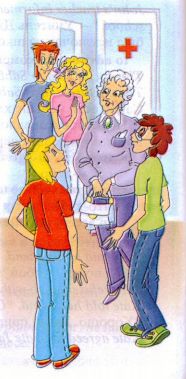
3 The tourists from Russia told Misha their story. Look at the pictures and guess the meaning of the words.

4 Read the story and find out what happened to Kolya.
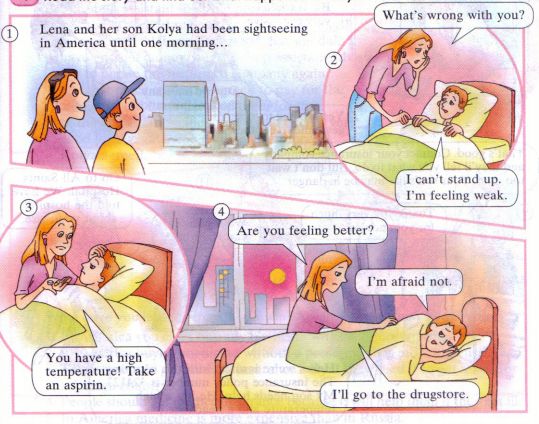
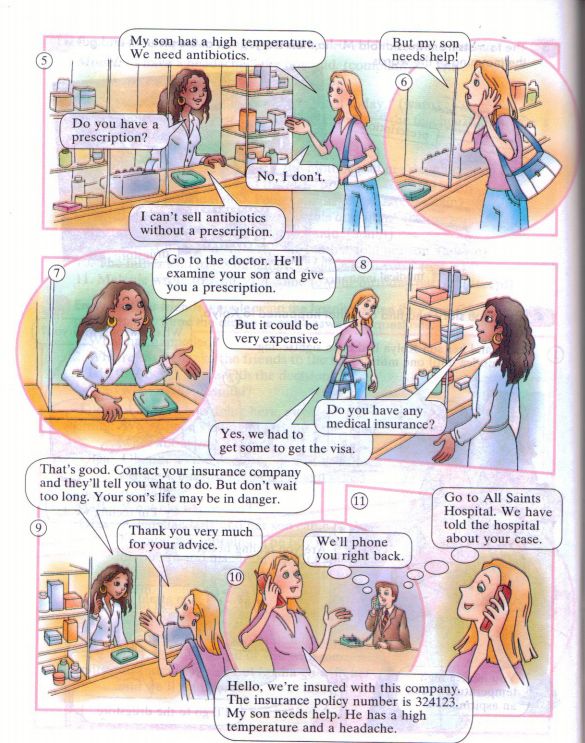
5 Misha is helping the tourists from Russia tell their story to the doctors in the hospital. Try to write the story in reported speech. Use the verbs from the list on page 100.
6 Listen to the story and check your version of it. In most cases more than one version can be correct.
7 Read about what happened at the doctor's office and then write dialogues for the pictures.
Model:The doctor asked Kolya where it hurt. Kolya
replied that he had a headache and was feeling
very weak.
1. He added that the boy would have to stay in bed for two days and take some medicine.
2. The doctor gave Lena a prescription for antibiotics and a nasal spray.Then the Russian tourists said goodbye and went to the drugstore.
3. The shop assistant took the prescription and warned Lena that the antibiotics and the nasal spray cost $180. Lena exclaimed that she didn't have enough money, but the shop assistant advised her to phone the insurance company again.
4. The insurance company agreed to pay for the medicine and Lena thanked them for that.
5. In the end Lena decided that it had been a very good idea to get some medical insurance. Kolya agreed.
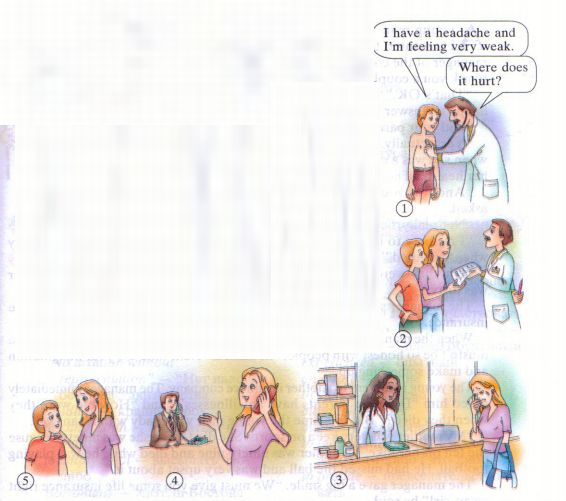
8 What have you learned from this lesson? Are these statements true or false?
1. In America you can't buy any medicine without a prescription.
2. In America buying medicine without a prescription is more expensive.
3. Tourists should get medical insurance only if they need it to get a visa for a foreign country.
4. People should get medical insurance because it will help them if they get ill.
5. In America medicine is more expensive than in Russia.
Homework
A Read the story and rewrite it in reported speech. Answer why the first manager couldn't insure the man's life.
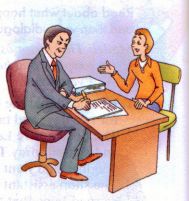
Honesty
A young man went into an insurance office.
He wanted to get some life insurance. The manager of the company said to him "We'll have to ask you a couple of questions."
"That's OK," the young man answered. "I'm happy to answer your questions."
"Did your parents have any illnesses?"
"Yes, actually. My mother was very unhealthy when she was a child, and she had problems with her health all her life."
"And was your father healthy?" the manager asked.
"Not really, he had heart problems."
"I'm sorry to hear that," the manager said quietly. "How old were they when they died?"
"Oh, they were still very young. My mother was thirty-five and my father was forty."
The manager sighed. "I'm sorry, sir," he said, "but I can't give you any life insurance."
When the man was leaving the office, another manager came up to him. "You mustn't be so honest with people," he smiled. "Next time use your imagination and make something up."
The young man went to another insurance company. The manager immediately asked him "Did your parents have any illnesses?" and "How old were they when they died?" But this time the young man was ready with an answer.
"My mother was very keen on sports. She died when she was ninety because she fell off her bike. My father was ninety-nine and died while he was playing football. He had missed the ball and was very upset about it."
The manager gave a big smile. "We must give you some life insurance right away, sir!" he said.
В Be ready to retell the story.
С Turn the following sentences into reported speech. Use ask, advise, agree, refuse, complain, promise.
1. "Don't phone Liz now," he said.
2. "Will you help me?" she asked. "Never," he said.
3. "Would you like some juice?" Bill asked. "Yes, please," Lisa said.
4. "May I give you some advice?" he said to the woman.
5. "I have a toothache," the girl cried.
6. "Of course I'll lend you the money," her brother said to her.
7. "I'll do my best to come back by 10 o'clock," Wendy said to her mother.
D Translate the sentences into English.
1. Нам предложили помощь.
2. Он отказался идти на вечеринку.
3. Мы посоветовали им позвонить врачу.
4. Продавец отказался продать лекарство без рецепта.
5. Она обещала послать телеграмму вечером.
6. Она согласилась встретить его.
7. Они не приняли нашего приглашения.
8. Она пожаловалась, что у сына высокая температура.
9. Друзья не советовали ей ехать в Египет летом.
К. И. Кауфман, М. Ю. Кауфман Английский язык: Счастливый английский.ру / Happy English.ru: Учебник англ. яз. для 9 кл. общеобраз. учрежд.— Обнинск: Титул, 2008.— 288 с: ил.
Английский язык для 9 класса, учебники и книги по английскому языку скачать, библиотека онлайн
Содержание урока
 конспект урока конспект урока
 опорный каркас опорный каркас
 презентация урока презентация урока
 акселеративные методы акселеративные методы
 интерактивные технологии
Практика интерактивные технологии
Практика
 задачи и упражнения задачи и упражнения
 самопроверка самопроверка
 практикумы, тренинги, кейсы, квесты практикумы, тренинги, кейсы, квесты
 домашние задания домашние задания
 дискуссионные вопросы дискуссионные вопросы
 риторические вопросы от учеников
Иллюстрации риторические вопросы от учеников
Иллюстрации
 аудио-, видеоклипы и мультимедиа аудио-, видеоклипы и мультимедиа
 фотографии, картинки фотографии, картинки
 графики, таблицы, схемы графики, таблицы, схемы
 юмор, анекдоты, приколы, комиксы юмор, анекдоты, приколы, комиксы
 притчи, поговорки, кроссворды, цитаты
Дополнения притчи, поговорки, кроссворды, цитаты
Дополнения
 рефераты рефераты
 статьи статьи
 фишки для любознательных фишки для любознательных
 шпаргалки шпаргалки
 учебники основные и дополнительные учебники основные и дополнительные
 словарь терминов словарь терминов
 прочие
Совершенствование учебников и уроков прочие
Совершенствование учебников и уроков
 исправление ошибок в учебнике исправление ошибок в учебнике
 обновление фрагмента в учебнике обновление фрагмента в учебнике
 элементы новаторства на уроке элементы новаторства на уроке
 замена устаревших знаний новыми
Только для учителей замена устаревших знаний новыми
Только для учителей
 идеальные уроки идеальные уроки
 календарный план на год календарный план на год
 методические рекомендации методические рекомендации
 программы программы
 обсуждения
Интегрированные уроки обсуждения
Интегрированные уроки
Если у вас есть исправления или предложения к данному уроку, напишите нам.
Если вы хотите увидеть другие корректировки и пожелания к урокам, смотрите здесь - Образовательный форум.
|
















